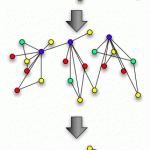Social learning is how work gets done in the network era. But what does that really mean?
Our dominant frameworks for structuring work are currently hierarchical structures, like corporations and bureaucracies. But these structures are failing us, as the world gets so networked that traditional command & control structures cannot deal with the rapid change and increasing complexity. As Umair Haque asked last year, “Name a ‘working’ institution. Just one. Better yet, define a ‘working’ institution. See the problem? ”
Because of powerful software and cheap worldwide communications, routine work is getting automated and outsourced. Routine means work that can be standardized, and that applies to any work that can have a ‘job description’. Here are some examples:
– recession & technology kill middle class jobs
If routine and standardized jobs are relics of the past, what can we do now to ensure that we have meaningful work?
The answer lies in our networks. Knowledge networks are like the paradox of life; the more you give, the more you get. If you don’t engage, you get nothing.
“We learned that individual expertise did not distinguish people as high performers. What distinguished high performers were larger and more diversified personal networks.” —Rob Cross, et al
In knowledge networks, openness enables transparency, which fosters a diversity of ideas. Diversity is essential for innovation, and innovation drives business success.
“We need input from people with a diversity of viewpoints to help generate innovative new ideas. If our circle of connections grow too small, or if everyone in it starts thinking the same way, we’ll stop generating new ideas.” —Tim Kastelle
Social learning is how work gets done in the Internet age. As John Kelldon observed, “In a network, one of the few things that scales really well is social learning.” It’s the secret sauce for organizational success today, increasing return on engagement for both employees and customers.
On March 1st, I will start my last workshop of our series at the Social Learning Centre, on Social Learning in Business. It is based on my work over the past few years, with both large organizations and free agents around the world. The focus will be on understanding networks and how social learning is the lubricant that helps intangible capital flow. In a world where intangibles drive the economy, we need practical ways to work in this fuzzy space.
Jay Deragon says that, “Work is a by-product of intangible capital that creates tangible results beyond expectations.” Intangible capital, unlike tangible capital, cannot be stored, moved, or transferred. It needs the constant involvement of people and their complex relationships. Supporting social learning is essential for organizations today. Understanding social learning is critical for managers. Practising social learning is important for all of us.



Harold, thanks for some useful thinking for reflections on how social learning gets things done in the internet age. I’d be interested in your observation on something, just because people are communicating does this mean that they are learning? Harold, what do you think the role of the training department is in shifting the way people behave to ensure that communication enables widespread, useful learning?
In PKM, I use a Seek-Sense-Share framework, and making Sense is always the most difficult for people to do. Sense-making (aka learning) takes effort http://jarche.com/2012/03/the-pkm-value-add/ Just because people are communicating does not mean they are learning, as anyone who has sat through a long meeting can attest.
I think we are quickly moving to an era when learning is no longer a specialty, and the training department will become obsolete:
http://jarche.com/2012/11/what-is-learnings-role/
Anya Kamanetz and the Edupunk movement comes to mind. I think fewer and fewer people have the patience to sit through a half day of conventional trainer-led material now. And I think Generation Y are pretty resistant to indoctrination from above. Your diagram is useful, thank you.
Harold, thanks for this insightful post.
I’m a believer in social learning and its importance but won’t write off training departments just yet. I think they do have a role to play at least in some organizations or at some levels (where routine work happens) in all organizations. If routine work is getting outsourced, will those organizations (where the work is being outsourced to) need more of training than social learning?
I guess I’m visualizing a framework/matrix of organizations, work types, roles, etc. and then coloring the individual boxes in lighter and darker shades to indicate amount of reliance/importance on formal training programs. Not sure if this makes sense but I’m kind of confused and concerned when social learning is being given a ‘be all and end all’ position in an organization’s training/learning mix.
Look forward to your insights!
Social learning is not the end all, be all, but it is my focus. There are enough training providers in the world. My focus is on the other 95% of workplace learning.
http://jarche.com/2012/01/informal-learning-the-95-solution/
Jane Hart has a good framework/matrix to describe this:
http://www.c4lpt.co.uk/blog/2013/03/11/supporting-self-managed-team-learning-in-the-organisation/
Making sense of how everyone is throwing around the term “Social Learning” is no easy task.
I don’t think that social learning is a new concept (we have learned from our peers since day 1), but thanks to technology it allows us to connect like never before. Sharing information and collaborating is much different today than even 10 years ago.
Social learning tools like TOPYX social learning management system have been designed to use available technology to provide an engaging learning environment that support education materials and communities. As social learning becomes more and more accepted due to the benefits it can bring any learning program, the use of this type of LMS software will also gain in popularity. TOPYX alone has over 10 million users.
Thanks for sharing the article! I will stop back to check out other recent posts.